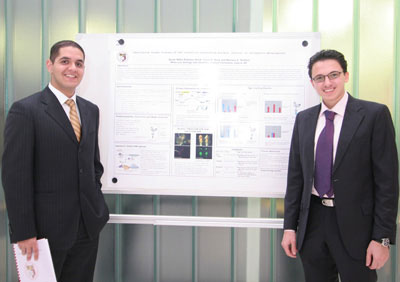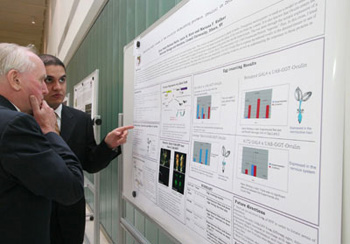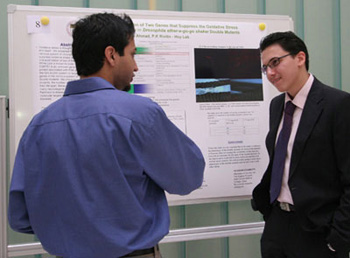Jordanian students search for answers in biomedical research
Stroke and diabetes are among Jordan’s major health concerns, according to the World Health Organization (WHO)*. Stroke, related to the high incidence of diabetes, is one of the country’s leading causes of death, followed closely by hypertension, coronary heart disease and cancer. Now Jordanian medical student Anas Ahmed, of Weill Cornell Medical College in Qatar (WCMC-Q), has been working on research to unlock the secrets of diseases that may result from stroke.

Jordanian medical students Qusai Saleh and Anas Ahmed present
their work at the third Annual Medical Student Research Forum.
Anas, of Amman, dedicated his summer to research in the neurobiology laboratory of Cornell University in Ithaca. Last week he presented his work at the third Annual Medical Student Research Forum at WCMC-Q.
Stroke can cause changes in the cells in the brain and lead to the development of neurodegenerative diseases, such as Alzheimer’s and Parkinson’s, Anas explained. “My project involved studying gene expression in living fruit flies to see how we can enhance the survival rate for flies that have a fatal mutation. The effect of these mutations mimics the effect of neurodegenerative diseases in human patients,” he said.
“The research could be used to try and develop new molecular treatments for patients with neurodegenerative diseases.”
Another Jordanian student from Amman, Qusai Saleh, said his research at Cornell University also focused on molecular biology and genetics, but had potential applications in an entirely different clinical field.
“I looked at the mating of fruit flies and the transfer of proteins that help the female to ovulate,” Qusai said. “The research will hopefully give us an insight into the biochemical pathways and how to improve in-vitro fertilisation.”
Outcomes of the students’ investigations were presented on November 6 at the Research Forum, a highlight of the WCMC-Q calendar. They were part of an extensive and varied program of 18 student presentations taking an in depth look at various health topics, from breast cancer to blood disorders to ventricular fibrillation**.
Students explained their work by way of oral and poster presentations to an audience that included faculty from Weill Cornell Medical College in Qatar and its parent campus in New York, students, Hamad Medical Corporation representatives, and other invited members of the medical community.
WCMC-Q Senior Associate Dean for Research Dr. Gary Schneider said the event followed the awarding of summer research fellowships for 2006, allowing recipients to travel to the US or stay in Doha and work with Cornell and Weill Cornell researchers for up to nine weeks.
“The students were assigned to teams led by some of Cornell University’s most outstanding researchers,” he said.
Anas Ahmed said the experience introduced him to basic scientific research and showed him how knowledge was created.
“Later on, when I graduate from medical school, I will be able to read scientific papers and know what researchers are trying to do so I can relay this to my patients,” he said.
Dr. Schneider said exposure to the potential opportunities that exist in biomedical research was of utmost importance for today’s medical students, who could go on to be tomorrow’s researchers.

First-year medical student Qusai Saleh explains his research
on molecular biology and genetics to Associate Dean for
Pre-medical Education, Dr. David Robertshaw.

Anas Ahmed (right) explains to a guest that his research
could be used to develop new treatments for patients with
neurodegenerative diseases.
* Country Cooperation Strategy for WHO and Jordan 2003-2007
** Ventricular Fibrillation: sudden chaotic heartbeats, a cause of cardiac arrest and sudden cardiac death
